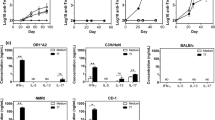Abstract
We evaluated the safety and immunogencity of a novel vaccine directed against autologous TNFα in a Phase I fixed dose escalation trial. The vaccine consisted of two recombinant TNFα proteins, with specific peptides replaced by foreign immunodominant T cell epitopes from tetanus toxoid. The main objectives were to establish a safe dose and evaluate the vaccines ability to raise neutralising TNFα antibodies. Secondary objectives were improvements in body weight and tumour response. Thirty-three patients were vaccinated with three doses (20, 100, or 400 μg) of TNFα vaccine at 2-weekly intervals adjuvanted with aluminium hydroxide. Anti-TNFα antibody titres were measured by both a RIA, using soluble native TNFα as the antigen, and by an ELISA using immobilized partly denatured TNFα. Eleven patients (33%) had mild grade1/2 injection site reactions at the higher doses. In 10 of 20 patients, serum antibodies recognize denatured TNFα in the ELISA, whereas, antibody titres against native TNFα in the RIA were undetectable. This suggests that the production process had partly denatured the vaccine preventing the formation of cross-reacting antibodies to native TNFα. In conclusion, TNFα vaccine was able to elicit vaccine specific antibodies. However, since the antibodies were only able to cross-react with partly denatured TNFα, evaluation of safety and tumour responses to the TNFα vaccine was compromised.




Similar content being viewed by others
References
Andreakos ET, Foxwell BM, Brennan FM, Maini RN, Feldmann M (2002) Cytokines and anti-cytokine biologicals in autoimmunity: present and future. Cytokine Growth Factor Rev 13:299–313
Carswell EA, Old LJ, Kassel RL, Green S, Fiore N, Williamson B (1975) An endotoxin-induced serum factor that causes necrosis of tumours. Proc Natl Acad Sci USA 72:3666–3670
Eggermont AM (1996) The success of TNF alpha in isolated limb perfusion for irresectable extremity soft tissue sarcomas, melanoma and carcinomas: observations in patients and preclinical perfusion models. Gan To Kagaku Ryoho 23:1357–1370
Mantovani G, Maccio A, Lai P, Massa E, Ghiani M, Santona MC (1998) Cytokine involvement in cancer anorexia/cachexia: role of megestrol acetate and medroxyprogesterone acetate on cytokine downregulation and improvement of clinical symptoms. Crit Rev Oncog 9:99–106
Waterston AM, Salway F, Andreakos E, Butler DM, Feldmann M, Coombes RC (2004) TNF autovaccination induces self anti-TNF antibodies and inhibits metastasis in a murine melanoma model. Br J Cancer 90:1279–1284
Cerami A, Ikeda Y, Le Trang N, Hotez PJ Beutler B (1985) Weight loss associated with an endotoxin-induced mediator from peritoneal macrophages: the role of cachectin (tumour necrosis factor). Immunol Lett 11:173–177
Sherry BA, Gelin J, Fong Y, Marano M, Wei H, Cerami A, Lowry SF, Lundholm KG, Moldawer LL (1989) Anticachectin/tumour necrosis factor-α antibodies attenuate development of cachexia in tumour models. FASEB J 3:1956–1962
Dalum I, Jensen MR, Hindersson P, Elsner HI, Mouritsen S, (1996) Breaking of B cell tolerance toward a highly conserved self protein. J Immunol 157:4796–4804
Dalum I, Butler DM, Jensen MR, Hindersson P, Steinaa L, Waterston AM, Grell SN, Feldmann M, Elsner HI, Mouritsen S (1999) Therapeutic antibodies elicited by immunization against TNF α. Nat Biotechnol 17:666–669
Therasse P, Arbuck SG, Eisenhauer EA, Wanders J, Kaplan RS, Rubinstein L, Verweij J, Van Glabbeke M, van Oosterom AT, Christian MC, Gwyther SG (2000) New guidelines to evaluate the response to treatment in solid tumors. European Organization for Research and Treatment of Cancer, National Cancer Institute of the United States, National Cancer Institute of Canada. J Natl Cancer Inst 92:205–216
Trotti A, Byhardt R, Stetz J, Gwede C, Corn B, Fu K, Gunderson L, McCormick B, Morrisintegral M, Rich T, Shipley W, Curran W (2000) Common toxicity criteria: version 2.0. An improved reference for grading the acute effects of cancer treatment: impact on radiotherapy. Int J Radiat Oncol Biol Phys 47:13–47
Petyovka N, Lyach L, Voitenok NN (1995) Homologous ELISA for detection of oligomeric human TNF: properties of the assay.Nielsen FS, Sauer J Immunol Meth 186:161–170
Backlund J, Voldborg B, Gregorius K, Mouritsen S, Bratt T (2004) Insertion of foreign T cell epitopes in human TNFalpha with minimal effect on protein structure and biological activity. J Biol chem 279:33593–33600
Ulbrandt ND, Cassatt DR, Patel NK, Roberts WC, Bachy CM, Fazenbaker CA, Hanson MS (2001) Conformational nature of the Borrelia burgdorferi decorin binding protein A epitopes that elicit protective antibodies. Infect Immun 69:4799–4807
Gardam MA, Keystone EC, Menzies R, Manners S, Skamene E, Long R, Vinh DC (2003) Anti-tumour necrosis factor agents and tuberculosis risk: mechanisms of action and clinical management. Lancet Infect Dis 3:148–155
Mikuls TR, Moreland LW (2003) Benefit-risk assessment of infliximab in the treatment of rheumatoid arthritis. Drug Saf 26:23–32
Netea MG, Radstake T, Joosten LA, van der Meer JW, Barrera P, Kullberg BJ (2003) Salmonella septicemia in rheumatoid arthritis patients receiving anti-tumor necrosis factor therapy: association with decreased interferon-gamma production and Toll-like receptor 4 expression. Arthritis Rheum 48:1853–1857
Maisey NR, Hall K, Lee C, Timotheadou E, Ahern R, Eisen T, Gore M (2004) Infliximab: A phase II trial of the tumour necrosis factor (TNFα) monoclonal antibody in patients with advanced renal cell cancer (RCC). ASCO Abstract 4514
Acknowledgements
We wish to thank Ferring Pharmaceutical for the funding of this Trial and Pharmexa for developing the vaccine and providing valuable advice, as well as Cancer Research (UK), who conducted the trial.
Author information
Authors and Affiliations
Corresponding author
Rights and permissions
About this article
Cite this article
Waterston, A.M., Gumbrell, L., Bratt, T. et al. Phase I study of TNFα AutoVaccIne in Patients with metastatic cancer. Cancer Immunol Immunother 54, 848–857 (2005). https://doi.org/10.1007/s00262-005-0661-x
Received:
Accepted:
Published:
Issue Date:
DOI: https://doi.org/10.1007/s00262-005-0661-x




